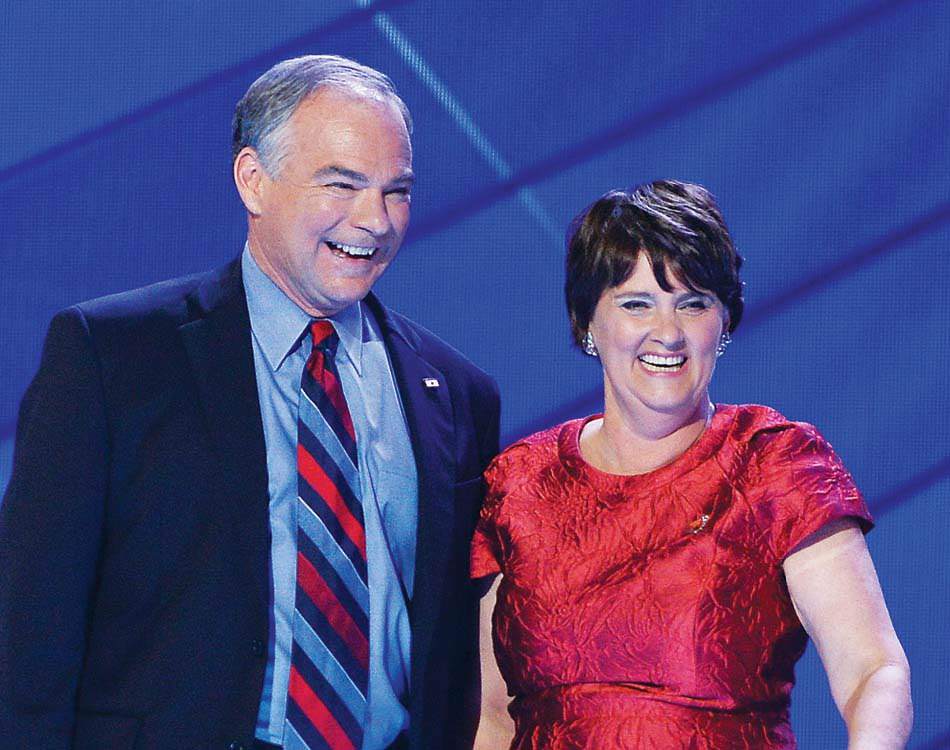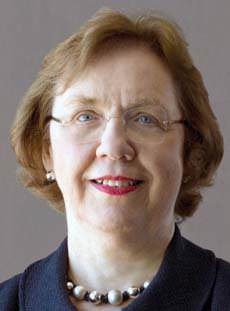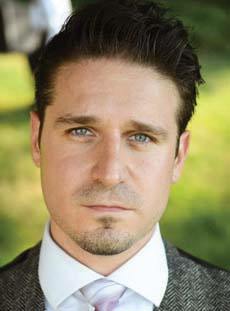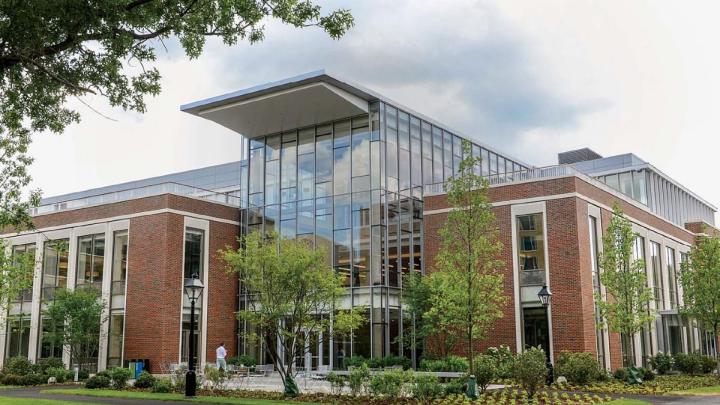Executive-ed Gateway
In early June, Harvard Business School dedicated the Chao Center, its new gateway for the extensive executive-education facilities at the eastern end of its campus. The facility replaces Kresge Hall, and serves as a convening and dining space for the Esteves, McArthur, and Tata residences (and for the wider business-school community). Chao completes a lushly landscaped executive-ed quadrangle, with ready access to the Charles River, Weeks footbridge, and Cambridge campus. Read about the ceremonial opening at harvardmag.com/chaodedication-16.
Sexual-Assault Lexicon
As an aid to “contextualizing” terms governing sexual violence, the Office of Sexual Assault Prevention & Response has posted on its website a staff-written vocabulary, under its “Get Involved” tab, covering concepts from “accountability” and “activism” through “hegemonic masculinity,” “intersectionality,” and “victim blaming.” One topic is “innocent until proven guilty,” defined as “a principle of the American criminal justice system where a person who has been accused is presumed to be innocent until the crime is proven beyond a reasonable doubt. This principle ideally protects those who are innocent and is of particular significance to minority populations disproportionately targeted for arrest, prosecution, and imprisonment or other consequences. In the context of sexual assault, ‘innocent until proven guilty’ is sometimes invoked to silence survivors; when a survivor’s experience is validated…it is assumed that there is an infringement on the liberties of the person who has caused harm, as well as a presumption of their guilt. Survivor-centric policies do not take away from the necessity of ‘innocent until proven guilty’ in the criminal justice system, as these ideas are not mutually exclusive.”
Life-Sciences Largess
Joan and Sanford I. Weill, who have given more than $600 million to Cornell, have now given $185 million to the University of California at San Francisco for a neuroscience institute. Their philanthropy follows a 2012 gift of $200 million from Mortimer B. Zuckerman, LL.M. ’62, to Columbia for interdisciplinary neuroscience, and Patrick and Lore McGovern’s support for MIT’s similar efforts, to the tune of $350 million. Harvard is known to be seeking support for major investments in neuroscience at the Medical School and within the Faculty of Arts and Sciences, too.…Separately, Oracle Corp. founder and chair Lawrence J. Ellison made a $200-million gift to the University of Southern California to establish the eponymous Institute for Transformative Medicine, which combines “interdisciplinary research with the holistic prevention and treatment of cancer.”
Easing into Gen Ed
With legislation adopted to revise General Education requirements taking effect in the fall of 2018 (see “General Education Reconstituted,” May-June), Jay M. Harris, dean of undergraduate education, notified returning students that they can take advantage of the liberalized requirements, too, during the transition. As of now, students can satisfy the aesthetic and interpretive understanding (AI) and culture and belief (CB) requirements with one course from each group, two from one group, or one designated course and one selection from a departmental course in arts and humanities. Similar logic applies to the science of living systems (SLS) and science of the physical universe (SPU) Gen Ed offerings, and to the societies of the world (SW) and United States in the world (USW) requirements—effectively freeing students to fill out their study cards with departmental, distribution-style course selections. They must still take an empirical and mathematical reasoning course; one in ethical reasoning, or an approved substitute; and one from the study of the past menu, or a recognized departmental substitute. The liberalization may help students find enough courses as the Gen Ed offerings are vetted and restructured for use in 2018 and after.
Humanities Inflection Point?
The American Academy of Arts and Sciences’ Humanities Indicators reported in early June that the number of faculty members in humanities disciplines increased 54 percent from 1999 to 2013 (during which postsecondary-student enrollment rose 41 percent), and then effectively plateaued. The proportion of newly minted humanities Ph.D.s reporting firm job offers shrank by 21 percent from 2006 to 2011. Inside Higher Ed reported that job listings for academic humanities positions are now 31 percent below the level reported in 2007-2008, the year just before the economic crisis; listings had been stable or increasing before the recession.

Tim Kaine and Anne Holton at the Democratic National Convention
Photograph by Anthony Behar/SIPA/The Associated Press
HLS on the ticket
Democratic vice-presidential nominee Tim Kaine, Virginia’s junior U.S. senator, is a 1983 graduate of Harvard Law School. Anne Holton, his wife, who is Virginia’s secretary of education, is also J.D. ’83. In 2012, Harvard Law Today reports, they returned to the school as panelists speaking about “How to Make a Lasting Public Interest Career Part of a Happy Life.”
On Other Campuses
Access Yale, which aims to raise $250 million for financial aid, in part to support 800 additional undergraduates phasing into the college during the next four years beginning next fall, had reached $195 million in commitments at the end of the first quarter, the Yale Daily News reported.…Northwestern plans to hire 20 additional computer-science faculty members—half in the core discipline and half as collaborative “CS+X” appointments with other disciplines (recent examples include music, journalism, and education); it anticipates a $150-million fundraising drive to support the expansion.…Across town, the University of Chicago, midway through a $4.5-billion capital campaign, is pursuing $30 million in savings by seeking to reduce administrative costs and academic-division budgets, a second consecutive round of belt-tightening, according to Inside Higher Ed. The cost controls follow a significant period of borrowing, higher debt, relatively slim operating surpluses, and a recent reduction in its long-term debt rating by Standard & Poor’s.
Nota Bene
Pricey parking. Fans who sought guaranteed “sideline seats” for The Game on November 19 were offered a package deal: $95 for a seat in section 35 of the Stadium, plus a ticket to the home opener against Rhode Island, in September…and for “just $50 a space,” Gate 14 parking passes for the Game.
Athletic limits. Ivy League scholar-athletes get a bit more time for their scholarship, beginning this season. The league adopted rules giving athletes a 10-hour window free from athletic activity following road trips, and a two-week period with no allowable team activities following completion of the season. A vote on similar rules by the NCAA’s “Power Five” conferences was postponed last winter.
Endowment changes. Harvard Management Company president and CEO Stephen Blyth, who assumed his positions in early 2015 and went on medical leave this past May, resigned those posts for personal reasons, effective July 27. A search for a successor is under way.…Robert Jain, formerly of Credit Suisse Asset Management and now co-chief investment officer at Millennium Management, a large hedge fund, has joined HMC’s board of directors, the most recent in an infusion of new board members overseeing investment of the endowment. Harvard Campaign co-chair Glenn H. Hutchins ’77, J.D.-M.B.A. ’83, co-founder of the Silver Lake private-equity firm, reached the limits of his HMC board tenure and stepped down.

Barbara J. McNeil
Acting medical dean. For the second time, Watts professor of health care policy and professor of radiology Barbara J. McNeil is acting dean of Harvard Medical School, following the conclusion of Jeffrey S. Flier’s service on July 31. The search for his successor resulted in the early-August announcement of George Q. Daley's appointment as dean, effective next January 1.
Development dean departs. O’Neill A.S. Outar, who joined the Faculty of Arts and Sciences as senior associate dean and director of development in September 2014, departed in early July—signaling another change in fundraising leadership during the faculty’s $2.5-billion capital campaign. No details accompanied the news, reported at harvardmag.com/fasfunds-16.

Stephan Magro
On deck for no. 366. Stephan Magro has been appointed Harvard’s Commencement Director, succeeding Grace Scheibner, who retired after 24 years of service following the graduation hoopla this past spring (Commencement Confetti, July-August). Magro previously organized alumni events such as the launch of the Harvard Campaign for Arts and Sciences and the annual Harvard College Fund Assembly.
Miscellany. Samantha Earp, executive director of HarvardX, the online-learning initiative, since 2014, has been appointed chief information officer at Smith College, beginning September 1.…Jocelyn Kennedy has been appointed executive director of Harvard Law School Library; she had been director for library services at the University of Connecticut School of Law.…Julie Crites, formerly of Boston’s Museum of Fine Arts, is Harvard’s new director of Common Spaces, a presidential initiative ranging from the transformation of Smith Campus Center to programming for the Science Center plaza and the placement of casual furniture around Harvard Yard.…In the brave new world of (Harvard) human resources, some employees learned this year that in lieu of a letter advising them of annual performance-based compensation increases they would “receive an email instructing them to view merit increase amounts in PeopleSoft self-service,” the University’s online personnel system.…Bowing to financial pressures, the Cornell Daily Sun is reducing its print publication schedule to three days weekly, freeing staff members to report news online around the clock—and making room for longer-form stories in the printed edition.…Access MIT, launched this summer, provides all Cambridge campus faculty and staff members free subway and local bus transportation, and increased subsidies for parking at public-transit station lots and for commuter-rail tickets; the low-carbon initiative may also lessen traffic pressure in congested east Cambridge. Harvard provides 50 percent subsidies for monthly mass-transit passes.








